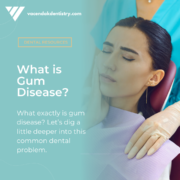What Exactly is Gum Disease?
You’ve probably heard about gum disease on television commercials and at your bi-annual dental cleanings, and you know it isn’t a good thing. But what exactly is gum disease? Let’s dig a little deeper into this common dental problem.
What is gum disease?
Gum disease, also known as periodontitis, starts with bacteria. When food and drink particles aren’t thoroughly brushed away, they can form a film on the teeth, known as plaque. Over time, the plaque hardens and turns into tartar, which can expand into the gums. Initially, gums will be red and swollen, a condition known as gingivitis. When left untreated, this can cause an infection which ultimately leads to gum disease. Gum disease damages the soft tissue in your gums and eventually breaks down the bones that support your teeth. This can result in loose teeth or even tooth loss.
How common is gum disease?
The likelihood of developing gum disease increases with age. According to the U.S. Centers for Disease Control and Prevention, 47.2 percent of adults aged 30 and older have some form of periodontal disease, and 70.1 percent of those over age 65 have gum disease. Gum disease is more common in men than in woman. It is also more common in smokers.
How is gum disease treated?
To treat gum disease, dentists employ a variety of tactics depending on the patient. These include deep cleaning of the tooth roots, more frequent dental cleanings, and oral or topical medications. In severe cases, corrective surgery and bone or soft tissue grafts may be necessary.
What are the warning signs of gum disease?
Common signs of gum disease include red or swollen gums, bleeding gums, and bad breath that won’t go away. Additional signs of gum disease include sensitive or loose teeth and gums that pull away from the teeth.
Can gum disease be prevented?
The good news about gum disease is that it can be prevented. Since it all starts with bacteria, keeping a clean mouth is the best way to prevent gum disease. Brush your teeth at least twice a day, ideally after you eat each meal. Floss regularly and use mouthwash to control bacteria growth. Be sure to visit your dentist twice a year for a cleaning and check-up.
If you are experiencing any warning signs of gum disease or if it’s time to schedule your next teeth cleaning and dental exam, call us today at 757-609-3510 or request an appointment online.



